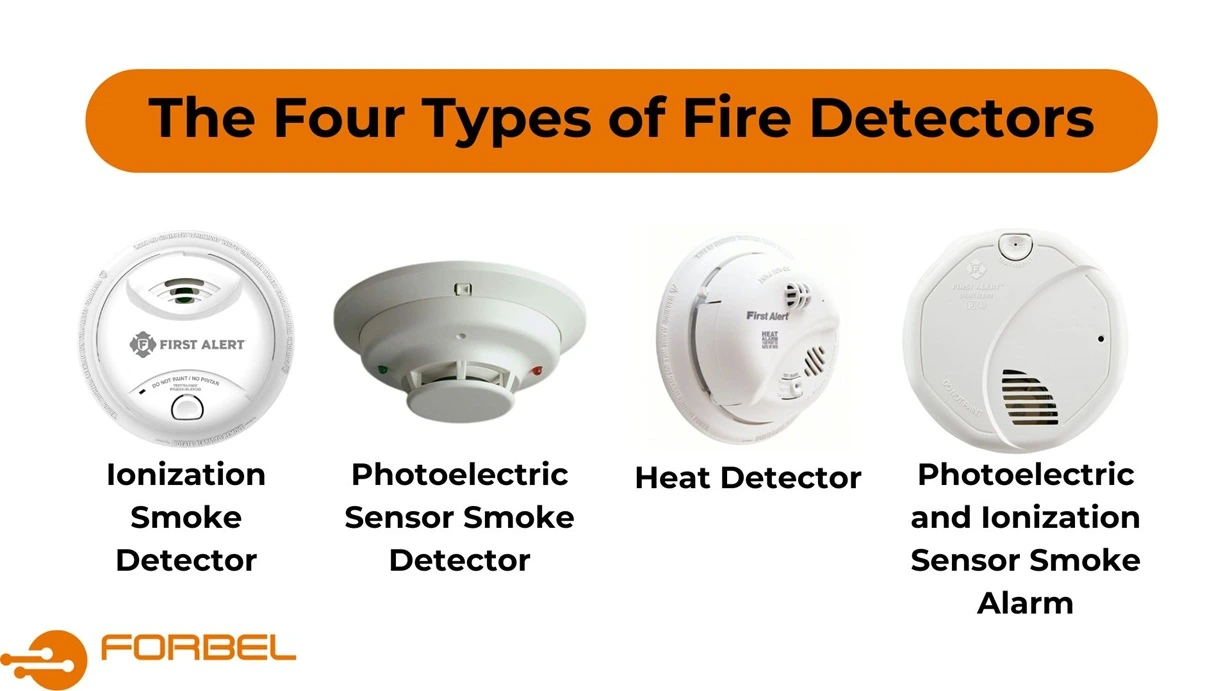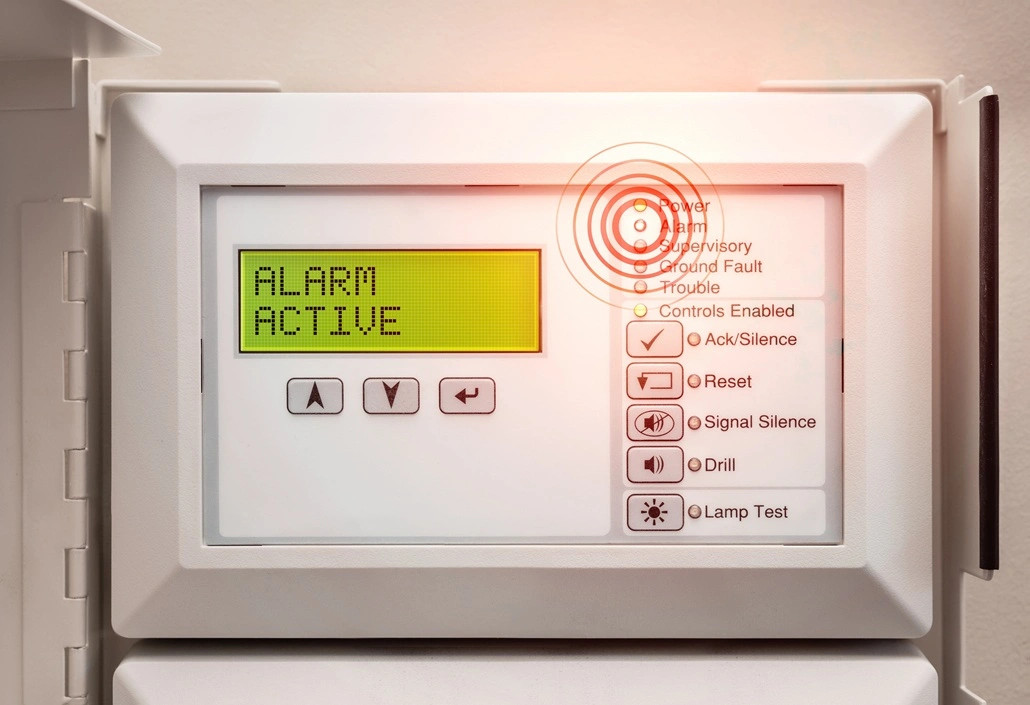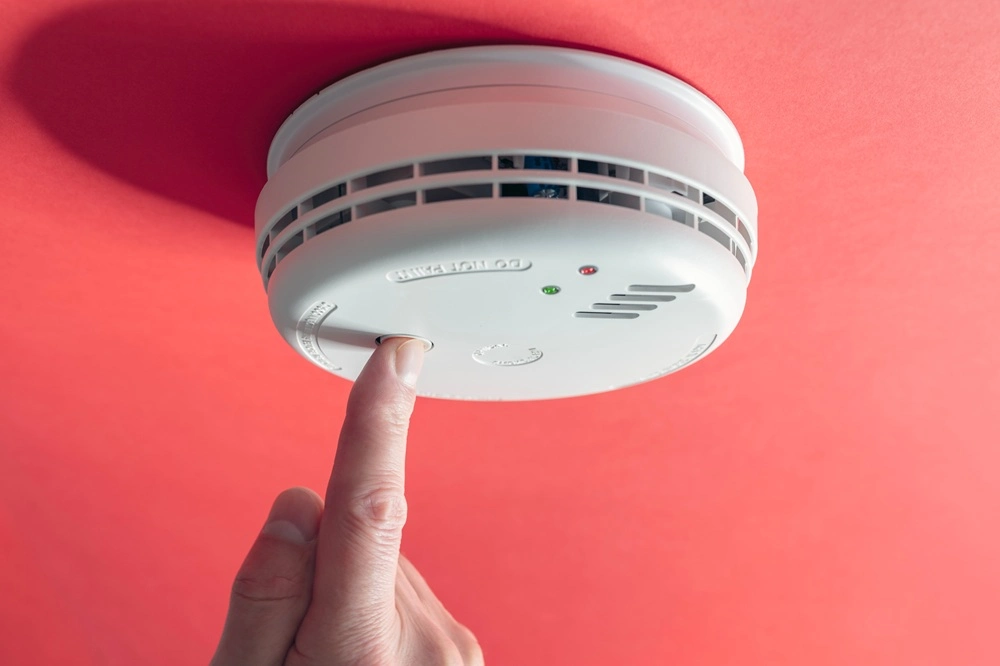
Different Types of Fire Alarm Systems and Their Detectors
Fire alarms are a key security system to prevent fire damage. Learn about different types of fire alarm systems and 4 types of fire detectors from this article!

As a business owner, it's important that you choose a fire alarm system that's tailored to your needs. When choosing a new system, you'll need to be mindful of the size of your property and consider how it works and how it can best protect your assets.
But how many types of fire alarms are there? You may feel overwhelmed. This is why our team at Forbel is sharing all the types of fire alarm systems, so you understand your options to make the best choice for you. Let's dive in!
The Four Fire Detector Categories

Did you know there's more than one type of fire alarm? Typically divided into four main categories — ionization, photoelectric, heat, and combined ionization/photoelectric — each one detects fires differently.
Below, we're sharing some key insights into each of the four types of fire alarm detector options. Check it out!
Ionization
Ionization smoke detectors rely on a constant electrical current. This current runs between two electrically charged plates within the device and is only disrupted when smoke enters. When this happens, it triggers an alarm signal to signal a fire. Typically, this fire alarm is touted for detecting fast-burning fires fast.
Photoelectric
Photoelectric smoke detectors operate similarly to ionization detectors; however, instead of electricity, they rely on a laser beam. This light is scattered when it encounters smoke, signaling the alarm to sound. This is an incredibly reliable fire alarm that works well with small fires.
Heat
Heat detectors signal an alarm when they sense a change in air temperature due to flames. However, since it's temperature-reliant, these alarms do experience false alarms due to humidity or steam. For this reason, these are most often relied upon in storage facilities or warehouses.
Combined Ionization and Photoelectric
A go-to in the industry, a hybrid of ionization and the photoelectric detector is often deemed the best option on the market. With both an electrical current and a light beam, this device is one of the fastest you can get, detecting smoke rapidly to sound a warning alarm.
Fire Alarm System Categories: Automatic vs. Manual Fire Alarm Systems
Fire alarm systems can be categorized into two types of commercial fire alarm systems:
- Manual fire alarm system: A fire alarm system that is manned and operated 24/7 by a person, and the alerts will be made manually at the pull station.
- Automatic fire alarm system: A fire alarm system that gets automatically triggered by fire or smoke.
The difference between them is clear. One relies on human supervision while the other does not.
Types of Fire Alarm Systems
Understanding the different categories of fire alarm systems (L1, L2, L3, L4, and M) is crucial for commercial property owners. According to NFPA 72 National Fire Alarm Code, L1 systems provide maximum life protection with detectors in all areas, while M systems rely on manual activation by occupants.
Now that we know the different fire alarm detectors, it's time to break down the types of fire alarm systems. From wireless systems to conventional fire alarms, there's one to best suit everyone's space. Here are the key differences to help with your search.
Two-Wire Fire Alarm Systems

A two-wire fire alarm is based on the standard conventional system; however, it utilizes a two-wire system. With this structure, the call points, detectors, and alarm devices are wired to two zone cables, going back to the fire alarm control panel. This two-wire system allows for increased flexibility that also has additional benefits like detector recognition and isolation.
Typically used in smaller spaces, this system is fast to detect smoke and cheaper to install; however, it costs more upfront.
Pros:
- 💰 Lower installation labor costs
- 🧰 Simplified wiring design
- 🔍 Easier troubleshooting
Cons:
- 💸 Higher equipment costs
- 🚫 Limited expansion capabilities
- 🔄 Compatibility restrictions
Wireless Fire Alarm Systems

With a wireless system, you'll have a fire alarm without cables connecting the detection device to the fire alarm panel. This system relies on multi-frequency links for heightened functionality, maintaining signal strength for constant protection. This system may be more expensive to purchase, but it's more flexible and quicker to install. Plus, it doesn't have all the cabling of a wired system, making it great for properties that don't allow wiring.
Pros:
- 🏛️ Ideal for historic buildings
- 🛠️ Minimal installation disruption
- ➕ Easy to expand
Cons:
- 🔋 Requires battery changes
- 📶 Signal interference risk
- 💵 Higher upkeep costs
Conventional Fire Alarm Systems
What is a conventional fire alarm system? It is a type of fire alarm system whose devices and panels are hardwired individually to the fire alarm control panel.
A conventional fire alarm system is a 4-wire system that is frequently used in smaller properties. This system divides space into different detection zones, with each wired to a dedicated circuit in a control unit. This allows for multiple detectors in each zone, and in the case fire is detected, the panel shows which zone the signal was triggered within. However, since it shares a zone, the location has to be checked out in person to find the specific location of the fire, which is the reason why it's best for smaller spaces.
This is one of the most affordable alarm systems and one that many shops and restaurants choose to rely on.
Pros:
- 💲 Cost-effective for small sites
- ⚙️ Easy to use
- ✅ Reliable over time
Cons:
- ❓ No exact location data
- 🧵 More wiring needed
- 📉 Limited features

Analogue-Addressable Fire Alarm Systems
The definition of an addressable fire alarm system is an intelligent system whose components are connected to each other and the control unit. An addressable fire alarm system allows you to set manual and automatic alarms in distinct parts of the building.
Unlike conventional systems that share a detected fire based on the zone, analog-addressable systems actually signal the specific detector that sensed smoke. Due to the specificity of this system, it's a reliable choice for large, commercial properties that need more specific identification of a fire that may not be readily visible or quick to locate within a zone.
Additionally, this system doesn't require as much cabling as a conventional one, and each detector has its own unique address to signal directly where a fire, heat, or smoke has been found.
Pros:
- 🎯 Exact alarm location
- 🧵 Less wiring needed
- 🧠 Smart diagnostics
- 🏢 Scales well for large sites
Cons:
- 💰 High upfront cost
- 🎓 Needs trained staff
- 🧩 Complex setup

Hybrid Fire Alarms
Hybrid fire alarm systems are the perfect combination because they allow the hardwired and wireless detection systems to work in harmony to create a more customized and efficient whole. In other words, if something damages the wires of the conventional system, the addressable system can come in as a reliable backup.
Pros:
- 🔧 Combines wired & wireless
- 🔁 Redundant & reliable
- 🧩 Flexible configuration
Cons:
- 💵 Higher overall cost
- ⚙️ Complex to design/install
- 🔌 Depends on dual system compatibility

Aspirating Smoke Detection Systems
One of the more sensitive fire detection options you can choose from, an aspirating system can pick up on extremely small fires much quicker than other systems. It does so with a fan that pulls in air from the building, which then passes through a pipe system, and a detector that checks for any signs of potential smoke particles.
While it's highly sensitive and reliable, this system is both expensive to install and keep up with. However, they're great in cases where you need the earliest warning of smoke or fire.
Pros:
- 🚨 Ultra-early detection
- 🏭 Works in sensitive zones
- 🔬 Detects small particles
Cons:
- 💸 Very expensive
- 🛠️ High maintenance
- 🧠 Requires expert setup

Integrating Fire Alarm Systems with Smart Building Technology
Modern fire alarm systems integrate seamlessly with building automation systems, access control, and HVAC systems. This integration enables automatic door unlocking during emergencies, elevator recall, and HVAC shutdown to prevent smoke from spreading. According to a 2023 study by Markets and Markets, integrated fire alarm systems can reduce emergency response time by up to 40 percent.
Smart integration capabilities include:
- Voice evacuation systems that provide clear, zone-specific instructions during emergencies.
- Real-time mobile alerts sent directly to facility managers and first responders.
- Automatic lighting control to illuminate escape routes and emergency exits.
- Integration with surveillance cameras for visual verification of alarm conditions.
- Cloud-based monitoring allows remote system management and diagnostics.
These advanced features transform traditional fire alarm systems into comprehensive life safety platforms that protect both people and property more effectively than standalone systems.
What Type of Fire Alarm Do I Need?

Wondering, "What type of fire alarm do I need?"
Fire alarms aren't one size fits all, and the best one for your needs depends largely on the size of your space, the cabling capabilities, and your unique needs or industry. What is the best type of fire alarm for a commercial property will be very different from that of a small store. With larger spaces, a system like the analog-addressable one is best to show exactly where a fire is, so you aren't searching high and low across a vast building to put it out. However, this specificity isn't needed in a small boutique where a conventional system will be perfectly fine.
There are several points to keep in mind:
- Types of buildings that need a fire alarm system
- Type of fire alarm system for your business
- Total budget for commercial fire alarm system
- Installation deadline
- Local codes and regulations
- Architectural drawings of the building
Before purchasing an alarm, we recommend doing your research and analyzing your space. Our comprehensive guide on commercial fire alarms can help you to make a decision, but the best option will be to consult with security professionals. Trust us — they know best.

Installation Timelines: Plan Your Project Properly
One of the most common questions we hear is "How long will this take?". There’s no one-size-fits-all answer, as it depends on your building and system type.
Conventional systems in small buildings typically take 1-3 days from start to finish, and medium-sized properties might stretch to 3-5 days. This includes running all wiring, mounting devices, and completing initial testing.
Addressable systems require more time due to programming and addressing each device. Expect 5-10 days for medium buildings and 2-4 weeks for larger facilities. Complex installations in hospitals or high-rises can take 1-3 months, especially when integrating with existing building systems.
Keep in mind that occupied buildings take longer, usually 25-50 percent more time, since we work around your business operations. Historic buildings often need special permits that add 2-4 weeks before work can begin. Each additional system integration (like connecting to your access control or HVAC) adds roughly 3-5 days, and custom programming for complex evacuation sequences might tack on another week or two.
Our advice? Schedule installations during your slow season to minimize business disruption. Most of our clients find that summer or holiday periods work best.
Keep Your Investment Protected: Maintenance Costs Nobody Talks About
Regular maintenance is essential for keeping your fire alarm system reliable. The National Fire Protection Association recommends monthly visual inspections and annual professional testing. But what does this cost?
Typical annual maintenance expenses include:
- Conventional systems: $200-$500 for basic service contracts.
- Addressable systems: $500-$1,500 depending on system size.
- Battery replacements: $50-$200 every 3-5 years.
- Sensor cleaning: $100-$300 annually for dusty environments.
- Software updates: $200-$500 for addressable systems.
Neglecting maintenance can result in system failure during critical moments, potential code violations, and insurance claim denials. Professional maintenance ensures your system is always reliable when lives depend on it.

The Hidden ROI: How Fire Alarms Save You Money
Here's something insurance companies don't advertise: proper fire alarm systems can reduce your premiums significantly. Basic systems often qualify for 5-10 percent discounts on property insurance, while advanced monitored systems can earn up to 20 percent off. For most commercial properties, that translates to $2,000-$10,000 in annual savings depending on property size and value.
However, the real value shows up in loss prevention. Fire damage without early detection averages $35,000-$150,000 for commercial properties. With a proper alarm system, you're looking at 50-70 percent less damage — that's serious money saved. Plus, you avoid the 3-7 days of lost revenue from business interruption.
The financial benefits don't stop there. Many businesses see lower liability premiums once they document their safety systems. Some industries even qualify for reduced workers' compensation rates. Your property value typically increases 2-5 percent with modern fire safety systems, and you can take advantage of Section 179 tax deductions for the equipment.
Most of our clients see full payback within 3-5 years through insurance savings alone, and that's before factoring in the catastrophic losses you'll hopefully never experience.
See Real Results: Fire Alarm Success in Action
Want to see how we solve complex fire alarm challenges? Check out our recent project where we helped an auto repair shop in Schiller Park meet strict village codes while staying within budget.
View Case Study: Fire Alarm System for Auto Repair Shop →
In this project, you’ll see:
- How we navigate challenging landlord-tenant situations.
- Cost-effective solutions that meet strict local codes.
- Integration of fire suppression systems with alarm systems.
- Wireless technology solving installation constraints.
Every business has unique fire safety challenges, and our team is always here to guide you in the right direction. See how we've helped businesses like yours find the perfect solution.

Ready to Protect Your Business? Here's Your Next Move.
Knowing the types of fire alarm systems is great when looking to equip your space with a new alarm network. With every home, store, and warehouse needing these trusty devices to protect both the property and the people within it, it's well worth it to do a bit of research. Whether you need a simple conventional system for a small retail space or a sophisticated addressable system for a large commercial complex, choosing the right fire alarm system is crucial for protecting your investment and ensuring occupant safety.
If you're unsure which type of commercial fire alarm system is right for your business, Forbel is here to help. Our certified technicians at Forbel specialize in designing, installing, and maintaining fire alarm systems that meet all local codes and regulations. Contact us today to find your new system and experts to handle fire alarm installation!
.jpeg)
Need Help Choosing the Right Fire Alarm System?
With so many options, it’s not always clear which one is best for your property. Our experts can guide you through the choices and recommend the system that fits your building size, budget, and compliance needs.

Heading
Faq
What are the differences between smoke detectors and fire detectors?
Smoke detectors are designed to specifically detect smoke presence in the air, a key indicator of a fire. Fire detectors, a broader category, include various types of detection devices like smoke, heat, and flame detectors. Each type of fire detector is specialized to identify different signs of a fire, such as smoke, a rapid increase in temperature, or actual flames.
How important are carbon monoxide detectors in a fire detection system?
Carbon monoxide detectors are crucial in a fire detection system because they can detect carbon monoxide gas, which is often produced in fires. They’re especially important in enclosed spaces where this odorless and colorless gas can accumulate quickly, posing a serious health risk to the building's occupants.
Can air conditioning systems affect the performance of fire detectors?
Yes, air conditioning systems can affect the performance of fire detectors. They can alter the distribution and flow of smoke and heat, potentially delaying the detection of a fire. It's important to consider the placement of fire detectors in relation to air conditioning vents and units to ensure effective fire detection.
What role do electrochemical cells play in fire detection?
Electrochemical cells in fire detectors are used primarily for detecting gasses like carbon monoxide. They work by producing a chemical reaction that generates an electrical current when specific gasses are present, thus triggering the fire alarm. This makes them extremely useful in detecting fires that produce toxic gases.
What is the purpose of pull stations in fire alarm systems?
Pull stations, also known as manual call points, are an essential component of a fire alarm system. They allow individuals to manually initiate the fire alarm in case of an emergency. This is particularly important in scenarios where the automatic detection hasn’t yet activated the alarm, allowing for a quicker response to the presence of a fire.
How do fixed temperature detectors function in fire alarm systems?
Fixed temperature detectors in fire alarm systems are designed to activate when the ambient temperature reaches a preset level, indicating the presence of a fire. These detectors are reliable in environments where rapid temperature rise indicates a fire hazard and provides an essential safety measure.
What are the considerations for installing a new fire alarm system in a building?
When installing a new fire alarm system, considerations should include the size and layout of the building, the type of fire hazards present, the need for integration with other safety systems, and compliance with local fire safety regulations. Additionally, make sure to consider the budget for installation and ongoing maintenance.
What are the different types of fire detectors and their applications?
The different types of fire detectors include smoke detectors, heat detectors, flame detectors, and gas detectors. Each type has specific applications based on the environment they are used in. For example, smoke detectors are commonly used in residential and commercial buildings, while flame detectors are more suited for industrial environments where visible flames may occur.
What are initiating devices in fire alarm systems, and how do they work?
Initiating devices in fire alarm systems are components that trigger the alarm. These include automatic detectors like smoke and heat detectors, as well as manual devices like pull stations. They work by detecting fire indicators (like smoke or heat) or through manual activation to alert occupants and emergency services of a fire.







